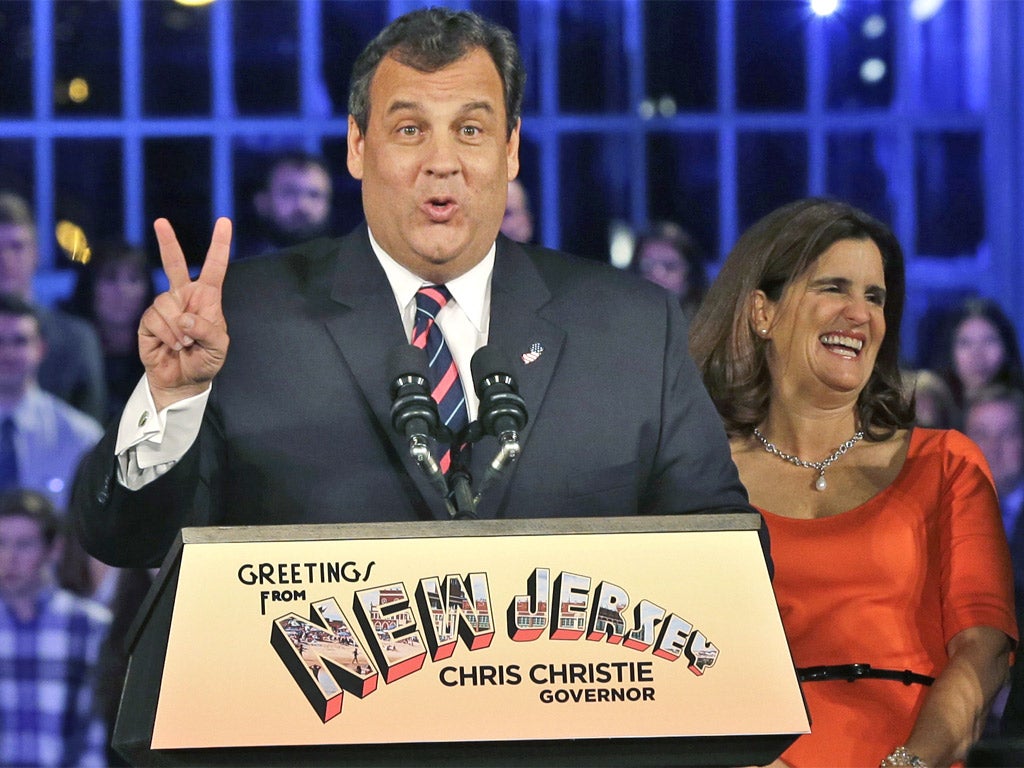Chris Christie's re-election as New Jersey's governor gives Republican party major boost in battle to recapture the White House
In recent decades, New Jersey has turned from presidential swing state into a Democratic stronghold

Your support helps us to tell the story
From reproductive rights to climate change to Big Tech, The Independent is on the ground when the story is developing. Whether it's investigating the financials of Elon Musk's pro-Trump PAC or producing our latest documentary, 'The A Word', which shines a light on the American women fighting for reproductive rights, we know how important it is to parse out the facts from the messaging.
At such a critical moment in US history, we need reporters on the ground. Your donation allows us to keep sending journalists to speak to both sides of the story.
The Independent is trusted by Americans across the entire political spectrum. And unlike many other quality news outlets, we choose not to lock Americans out of our reporting and analysis with paywalls. We believe quality journalism should be available to everyone, paid for by those who can afford it.
Your support makes all the difference.Pragmatists have received a major boost in the battle raging for the soul of the Republican party with Tuesday's off-year elections, in which New Jersey's governor Chris Christie provided an object lesson in how the Grand Old Party might recapture the White House in three years' time.
In statistical terms, even Mr Christie's 61 per cent to 38 per cent win to secure a second term wasn't the landslide of the night: that distinction went to Bill de Blasio who rolled to a crushing 73-24 victory on his way to becoming the first Democratic mayor of New York City in 20 years.
But in national terms, Mr Christie's triumph, coupled with the defeat of the Tea Party-backed Ken Cuccinelli in Virginia's gubernatorial election, will be the real talking point - above all among Republicans seeking to restore the party's popularity, now close to an all-time low.
In recent decades, New Jersey has turned from presidential swing state into a Democratic stronghold. But Mr Christie won among women and Hispanics, and even scooped up a quarter of the black vote, another constituency where Republicans have failed dismally in recent years.
In his victory speech, he was careful to keep the emphasis local. But the occasion felt like the precursor to a presidential campaign. The blunt-spoken Mr Christie has never ruled out a White House bid in 2016, and should he run he would almost automatically become the moderates' front runner, a formidable challenger to any Democrat.
First however he would have to navigate the Republican primaries. “If we can do this here in Trenton [the state capital], then maybe the folks in Washington DC should tune in their TVs right now and see how it's done,” he told his exuberant supporters, contrasting his record of working with Democrats to achieve results in New Jersey with the gridlock and dysfunction of the national capital.
That message though would not go down so well in during the primaries, dominated by conservative activists who regard any hint of readiness to compromise with the enemy as a betrayal.
Nonetheless Tuesday offered other pointers that the tide may be turning against the party's radical right and the Tea Party movement, after the government shut-down and brush with financial default that were provoked by far-right Republican in Congress.
In Virginia the shutdown was an especially important issue, not least in the suburbs around Washington DC, full of federal government employees who felt the financial impact first hand. Instead Mr Cuccinelli courted Tea Party support, and alienated women and other moderate voters with his hardline views on abortion and other social issues.
The Cuccinelli camp would argue he was hurt by a third party libertarian candidate who siphoned off 7 per cent of the vote. They point too to the massive fundraising advantage of his victorious opponent Terry McAuliffe, a former Democratic party chairman and close personal friend of Bill and Hillary Clinton who stumped on his behalf.
Even so Mr McAuliffe was generally seen as a weak candidate, who ultimately won by a mere two points, far less than pre-election polls suggested. Mr Cuccinelli closed the gap in the final days by concentrating his fire on the President Obama's increasingly unloved health care reform. But those same polls also indicated that a more centrist Republican making the same argument might well have prevailed.
In another sign the the radical right's influence may have crested, an establishment-backed candidate defeated his Tea Party-backed opponent in a closely watched primary to select a candidate in a conservative Alabama House district, which Republicans have held for over 40 years.
Join our commenting forum
Join thought-provoking conversations, follow other Independent readers and see their replies
Comments